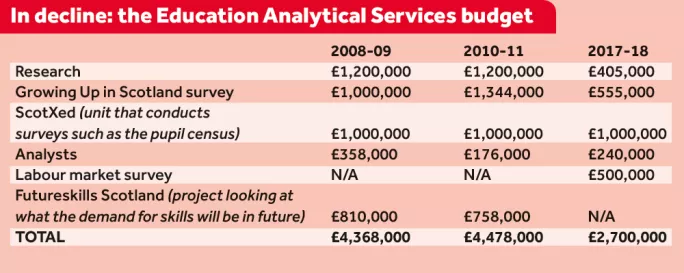‘Disturbing’ 40% cut to education research budget

The government unit responsible for educational research and analysis has suffered a 40 per cent budget cut over the past seven years, Tes Scotland can reveal.
In 2008-09, the Education Analytical Services (EAS) budget was £4.4 million, rising to a peak of £4.5 million in 2010-11 but dropping to £2.7 million in 2017-18.
The news coincides with growing calls for teachers to make better use of research.
It also comes just months after the Scottish government published its education research strategy aimed at giving Scotland “a more robust evidence base upon which to make decisions”. The strategy was a response to the 2015 Organisation for Economic Cooperation and Development (OECD) report Improving Schools in Scotland, which criticised the lack of “any large-scale research or evaluation projects by either the universities or independent agencies” and called for “more active partnerships with the research community”.
The strategy has been welcomed by academics but it has also come in for criticism because the government failed to reveal how much funding would be made available to realise its goals.
‘Show us the money’
Royal Society of Edinburgh education committee convener Keir Bloomer described the figures uncovered by Tes Scotland as “very disturbing”. He called for the government “to reassure the education community that it is serious about its strategy… by being transparent about the level of funding that will be committed to it”. Mr Bloomer said: “It is very disturbing to learn that spending has actually fallen and is now only 60 per cent of the level seven years ago.”
The figures also reveal that funding for the high-profile longitudinal survey Growing Up in Scotland - which is included in the EAS budget - has been more than halved from £1.3 million in 2010-11 to £555,000 this year.
Tes Scotland understands that this drop is largely due to a planned reduction in the frequency of surveys.
However, it has now emerged that funding for the survey - which has been running for over a decade - is expected to fall further because of a government decision to stop recording data for children born in 2010-11 - the last cohort.

The Scottish government said the EAS budget did not represent the full range of its investment in research and data.
A spokesperson did not provide the overall amount of education research funding, but pointed to work taking place as part of the Scottish Attainment Challenge, which was launched in 2015.
This includes £250,000 on developing a Scottish version of the Education Endowment Foundation’s Teaching and Learning Toolkit, which highlights the most effective interventions for raising attainment.
The spokesperson also highlighted the “significant investment” in the new national standardised assessments due to run for the first time in the coming school year. However, Conservative education spokeswoman Liz Smith said that Tes Scotland’s figures fitted with the findings of the 2015 OECD report and the “constant” concerns expressed by academics since then. “In its recent report into Scottish schools, the OECD made plain its concerns about the lack of good quality data to measure the progress within the school system, and that has also been the constant concern among the RSE and the education departments of our universities,” she said.
‘Slashing’ funding
Labour education spokesman Iain Gray, meanwhile, accused the government of being “all talk when it comes to education”.
“Ministers claim to have an ‘education research strategy’ and are setting up a ‘National Advisory Group’ and an ‘Academic Reference Group’. Meanwhile, they are slashing funding for actual education research,” he said.
“If education really was the SNP’s priority, and if it really was interested in ‘what works’, then it would be increasing educational research, not cutting it almost in half.”
Stephen McKinney, president of the Scottish Educational Research Association, told Tes Scotland last month that there was “serious anxiety” among academics about the availability of government funding for educational research. Professor McKinney, who is based at the University of Glasgow, described the new figures uncovered by Tes Scotland as “very disappointing” and urged the government to invest more.
“The members of our executive are senior figures in Scottish education and they are saying the money is not out there [for educational research],” he said.
However, a Scottish government spokeswoman said the government was “firmly committed” to drawing on “a range of evidence” to inform policy decisions.
She added: “In line with the OECD’s recommendation, we are taking further action to better understand what is working in our schools and what isn’t - including the new research strategy for education we launched in April, after discussions with academic and education stakeholders.
“This is designed to direct research investment in key strategic areas in order to make effective use of the best evidence as we continue to drive improvement, raise attainment for all and close the poverty-related attainment gap.”
You need a Tes subscription to read this article
Subscribe now to read this article and get other subscriber-only content:
- Unlimited access to all Tes magazine content
- Exclusive subscriber-only stories
- Award-winning email newsletters
Already a subscriber? Log in
You need a subscription to read this article
Subscribe now to read this article and get other subscriber-only content, including:
- Unlimited access to all Tes magazine content
- Exclusive subscriber-only stories
- Award-winning email newsletters
topics in this article



